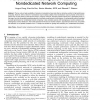Free Online Productivity Tools
i2Speak
i2Symbol
i2OCR
iTex2Img
iWeb2Print
iWeb2Shot
i2Type
iPdf2Split
iPdf2Merge
i2Bopomofo
i2Arabic
i2Style
i2Image
i2PDF
iLatex2Rtf
Sci2ools
116
click to vote
TC
2002
2002
Performance Modeling and Prediction of Nondedicated Network Computing
The low cost and wide availability of networks of workstations have made them an attractive solution for high performance computing. However, while a network of workstations may be readily available, these workstations may be privately owned and the owners may not want others to interrupt their priority in using the computer. Assuming machine owners have a preemptive priority, in this paper, we study the parallel processing capacity of a privately owned network of workstations. A mathematical model is developed to predict performance for nondedicated network computing. It also considers systems with heterogeneous machine utilization and heterogeneous service distribution. This model separates the influence of machine utilization, sequential job service rate, and parallel task allocation on the parallel completion time. It is simple and valuable for guiding task scheduling in a nondedicated environment.
Information Technology | Machine Utilization | Parallel Processing Capacity | TC 2002 | Workstations |
Related Content
| Added | 23 Dec 2010 |
| Updated | 23 Dec 2010 |
| Type | Journal |
| Year | 2002 |
| Where | TC |
| Authors | Linguo Gong, Xian-He Sun, Edward F. Watson |
Comments (0)

